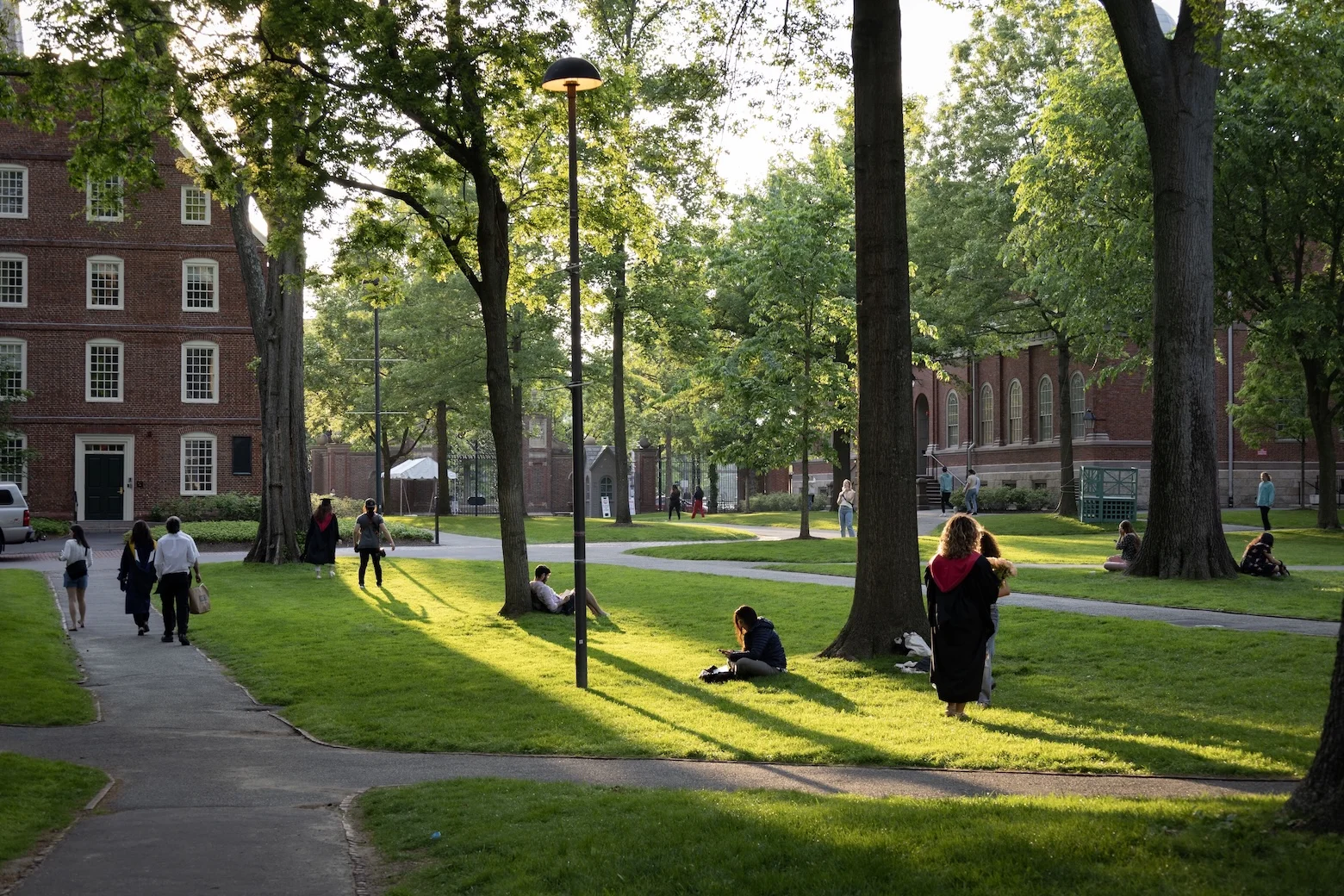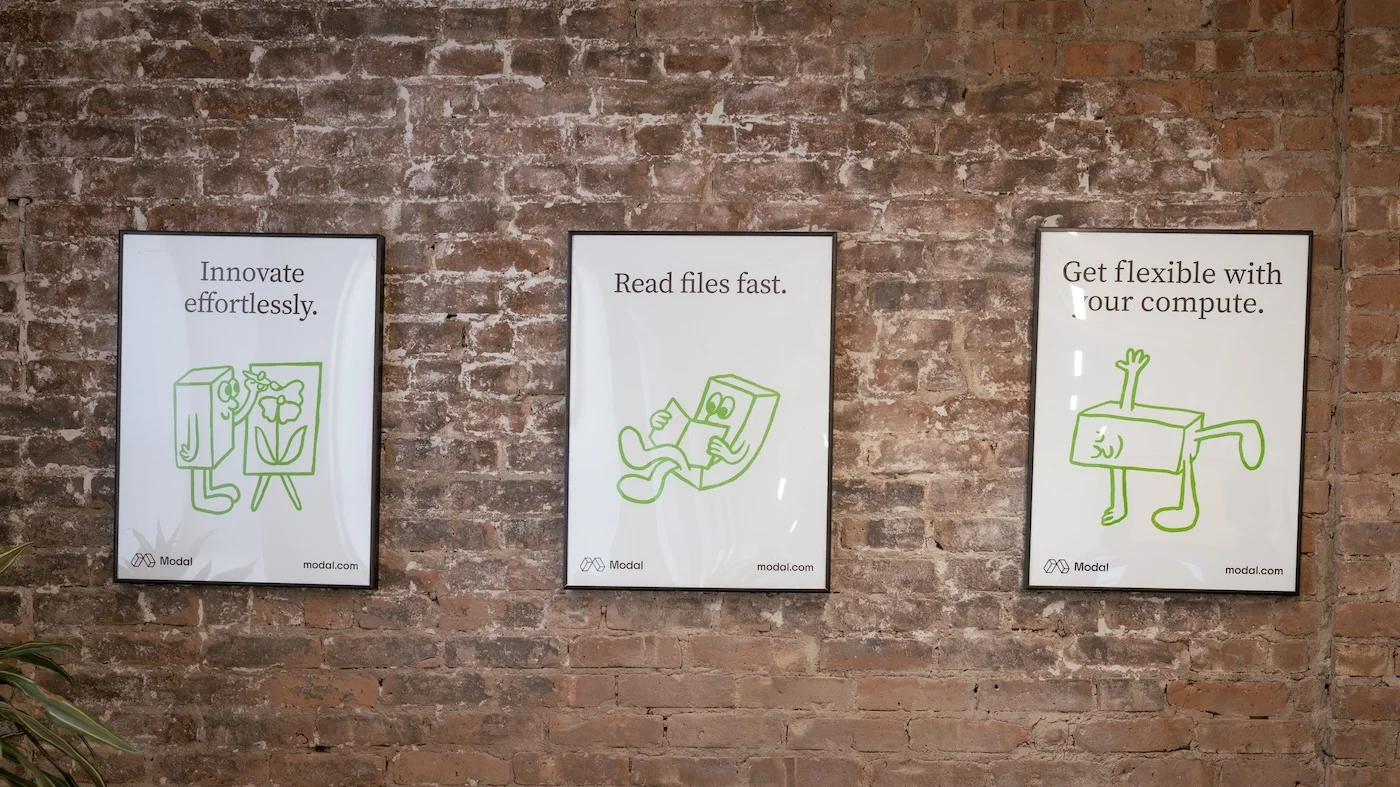192 Weeks
“How many weeks are between Jan 31, 2022 and Oct 6, 2025?”
Eric Zhang•October 24, 2025
A couple weeks ago, I left my first job. I had worked there since 2022.
I joined when I was still in college, as a “founding engineer,” which as a job title means the startup was tiny and needed to grow a lot. And it grew—the company recently raised at a $1 billion valuation, and I left as one of the key engineers in a team of 70 people.
Modal is now a successful business, and it has a wonderful team that will continue to do great things. But it also meant a lot to me, as all first jobs do. I thought I should write a bit: not really about what went right or wrong (I’ve had many chats with coworkers!), or learnings, but rather some personal memories of how it felt to live through this.
I’ll focus on the early years, as there’s a lot to cover.
Prelude: Covid (2021)
In 2021, I was 20 years old. I had been spending the past year virtually taking classes at Harvard. Covid was still present but winding down, and I wasn’t happy, so I decided to take time off.
I recently went through some of my writing at the time to get a sense for how I felt. Looking back, I felt pretty lonely, wanted to be kind to people, liked beautiful words, and had lots of ideas around making interesting systems and software.
There was joy and instability. The world had just opened up in college, and then everything went into hiatus. I spent long hours alone. I remember seeking companionship—I learned to smile a lot more at people since it felt nice when people smiled back.
At school, I had worked through the most difficult systems + theory CS classes at Harvard, and I made some open-source software projects: of those, Set with Friends, fastseg, Crepe, Rustpad, and Percival were the most well-known.
Even though I did a bit of everything, I also didn’t really know much at all. Professors would ask: what do you do? And I recall answering: systems, ML, graphics, PL, HCI, math, … and for an undergraduate it was too much. Still, that curiosity was key; I think when you’re curious the whole world opens up to your eyes, and you unlock the intrinsic beauty in so many places.
A mentor once remarked that a lot of your values are developed in those 18–22 years, being post-adolescence. I hadn’t yet found what felt right and true for me, in grades, internships, extracurriculars, research and so on, so I felt compelled to leave school for a bit.
“Ejecting” school
Around late 2021, I posted on Facebook (people still used Facebook) mentioning that I was going to leave school at the time.
My post caught the attention of a friend in the competitive programming
community, and I was connected to Erik and Akshat. Modal seemed like a great
idea! They had me at function.map(range(100)), so I signed on to join the
company.
Why leave school? I told people I was taking a break to find creative voice. In other words, I didn’t know what was going on in life and was confused about being an adult; I felt I had to create my place to exist and belong. So I looked to making work.
Anyway, at a small startup my “do everything” background ended up being useful. I carved out a bit of an unconventional role as the most low-level and high-level engineer: I built Modal’s distributed cloud container runtime in Rust and deployed core infrastructure services at microsecond latency—but I also wrote and themed most of the frontend web app, trading off days between filesystem performance benchmarking and interface design.
Honestly, I may have been kind of annoying to work with. I remember within a week of joining, I had reformatted the whole codebase, encoded it into CI, and then written an essay on Slack about how we should rewrite the frontend in Svelte + Tailwind and the container runtime in Rust. People said no, but then I went ahead and did it anyway.
Somehow these decisions stuck, and over the next couple years I was naturally the technical lead for a bunch of systems and product work, and that’s how a 20-year-old kid ended up writing 20–25% of all the code at a tech startup early on.
New York City (2022)
My gig at Modal was also the first time I lived on my own. It was very cold. New York had quite a bit of snow that season. My breath often traveled up my face mask and clouded up the lenses of my glasses.
I didn’t have any friends in the city. I learned to make food for myself.
To any college student who has never spent a long stretch of time by themselves, I kind of recommend it. It can be quite peaceful. You don’t really need so much to be happy, even if a sudden transition makes it feel like a bit of social withdrawal at first.
It took a few months for me to appreciate NYC.
Exploring cities is really delightful. Once you get past the grungy bits and learn to walk a bit faster in pedestrian traffic, New York is a great place to explore. My habits changed from visiting attractions to taking long walks around the island and its environs, where you can feel the life in the people and places as you drift.

Back to school (2022–2023)
By mid-2022, Modal had gotten its first few customers, and I had built an early version of the container runtime systems and product.
A bunch of things happened on the side. In terms of projects, I had been going to Boston every 3 weeks to stay connected to college and developed Bore while on the Amtrak. This quickly became my most popular GitHub project despite being ~400 lines of Rust code and not that interesting(?), but to be fair, you can say the same about most successful tech companies we admire. “What people want” is roughly inversely related to technical difficulty, for engineers.
I also met some people (who became lasting connections) after presenting my early PL/HCI research at the first HYTRADBOI. I had followed Jamie since reading his essay Against SQL. Honestly I think this was a great experience, although I don’t really know where I was going with that research project anymore. Working on PL was fun!
Around this time, I went to Interact. This was my first exposure to Silicon Valley culture (“young tech” albeit pre-AI) and wow, it was a bit of culture shock. I don’t think I agreed with many of the dominant values or perspectives (and I still don’t—but I know how to speak their language and find common ground now with their ambition). Nevertheless, Interact was really fun; this community had many kind and generous people.
Anyway, back to personal life. Modal had been doing great, and in my original employment, I had always wanted to go back to school and finish 4 year term. So I went back to school for my senior year, and I worked 40% part-time at Modal in the meanwhile.
When people decide whether they should drop out, I think it depends on your answer to the question: “What do you want to get out of school?” I think about this Crimson op-ed. College is a stepping-stone and increasingly it’s more about launching yourself into a lucrative career or developing a business foothold; but it wasn’t always this way. And for me, I wanted to learn a lot of different things, so I went back to school to finish that up.
That final year of college, September 2022 – April 2023, was probably the most I’ve ever enjoyed school. Maybe it’s because everyone was back in-person, but I learned so much. Some stuff I did in the first semester:
- Started Harvard Systems Reading Group to meet people with similar interests, which later became NYSRG. I’ve now been hosting this for 3 years and have met over 300 people.
- Learned how computer networking works, took an advanced networking class for ML, worked on some early tensor and pipeline parallelism codebases (pre-ChatGPT).
- Rehearsed chamber music with some of the “kindest, most perceptive, caring, curious, and interesting people I know,” or so I wrote at the time. “The larger world may be chaotic, but it has never looked so beautiful as it does in that moment when you’re together and creating something larger than your individual selves.”
- Took a class on nanotechnology fabrication at MIT. Seriously, this is an actual class you can take, where you make perovskite nano-electronics!
- Took a neuroscience class where my first assignment was to go to an art museum, pick an artwork and silently stare at it for an hour. I think the class permanently changed how I look at art.
If this sounds like fun, yeah school can be like this! It doesn’t just have to be tests and problem sets. I didn’t get better at programming, but I derived a lot of personal fulfillment, learned about many different fields, and figured out what I truly care about.
So in the final semester, I was ready for more:
- I enrolled in 6 different classes, all in different departments. I wanted a sampling of all the things I was still curious about.
- Some of the classes included phonetics and phonology (learned the IPA!), number fields (learned Galois theory!), photography (learned cameras, taking photos!), and chamber music once again.
- I was also writing a thesis. This ended up being like 100 pages long, haha. And I only started the last month before it was due. It ended up consuming most of my afternoons, nights and weekends during that month—even though I basically just stapled together my past PL research work.
- Around March, I realized I was missing one credit away from graduating and panic-added the only two half-term classes I could find. So at that point, I was enrolled in classes in eight different departments! (Math 129, CS 299, Ling 105, GENED 1123, AFVS 41K, Music 189R, DPI 622MC, IMMUN 305QC)
- This was kind of nuts, especially with everything else going on at the time and working at Modal. Luckily I had found out that my thesis work could count for class credit retroactively, and I dropped the classes at the Kennedy School and Medical School. But it was neat to hang out with all the grad students for a bit and learn how they think! Even though I was tired, I was having a ton of fun, so it wasn’t so bad.
- I played in the pit for a musical, which was delightful. During the two-week run, we performed it like 8 times, and it’s a long show! I knew every lyric by heart.
Roughly I can break up the semester into a few 3-week “chunks” in my mind. And since school, I don’t think I’ve ever been able to have such high definition in any period of activities so far, there was just a lot more interesting and uniquely meaningful content, so much to learn.

So while it was the first time in my life I wasn’t writing any code on the side, those 8 months still felt fulfilling.
I took a month for myself, found an apartment in Manhattan, then started working full-time at Modal again. I did look briefly for other jobs at that point and had offers (notably, Cursor and Anthropic were very early and missed opportunities), but I didn’t believe in AI at the time of GPT-3.5. I really believed in good systems work.
The company grows, I grow (2024)
Modal was just 9 people in mid-2023, just a single moderately-sized engineering team. By the end of 2024, it was roughly 33 people. A lot changed in the meantime.
I think the biggest thing for me was learning how to build systems. Not just the operational and software expertise needed to develop them, but also how to navigate social situations and work with people who may not always see things in the same way. You know, standard stuff you learn at a first job if you care about your work going well.
Feels that I’m a little bit too early in my career to start writing about engineering culture / process without it sounding too much like “thought leadership” junk. But I got a better sense of it in the way that you only get through experiencing this kind of high-level decision making firsthand.
I don’t mean to trivialize it by the way. Modal was really difficult. At startups, the business is scaling and changing every month. You have to train and learn to work with so many new people, in an environment where “just go slower” isn’t a tractable option.
A few questions for me to continue thinking about:
Technical direction. How do you keep tabs on all the developments happening across a team of 10, 20, 50 people? What do you do when someone isn’t taking things in a good direction? How do you give feedback in a way that feels kind, timely and not too burdensome?
Teams. How do you get people to know each other and feel belonging? How do you have honest discussions about complex problems where everyone has some prejudices, many times unintentional? How do you have conversations about nebulous things like “culture” and “voice” as a group?
Product. What do users want in a product? How do you plan projects? How do you scale up development when you’re carrying a lot of the initial load, and advocate for others to share engineering maintenance when it becomes too much for just you?
My first year in NYC was also a “social year” of sorts. I resolved to never say “no” to an invitation for social reasons, as my inbox was heavily imbalanced with a lot of tech outreach. People wanted things from me, but they didn’t want to hang out. So I went to a lot of birthday parties, hangouts, walks, meals with friends, etc., and hosted a bit myself.
It takes a lot of time to build up a network of friends. At least in New York, adult friends come and go every once in a while, they’re all busy and the rhythm is that of work, punctuated with occasional catch-ups and life milestones. I sometimes catch up with someone and realize, “wow, I’ve known you for 2 years already?” — and it’s because we see each other perhaps once every few months, with long gaps.
If school is a constant stream of stimulation, friendship as an adult is more like tending a garden. You water it regularly and gradually see something emergent in the earth.
So even if it doesn’t feel like you have a lot of people to talk to, they are there. I think going from college to a job as an adult is really difficult, and what personally kept me through it was something a friend once told me: “I worry about forgetting to allocate enough time for all the people I care about.” Another important piece of advice, I got from a young artist: “Everyone goes through crises; working through them is part of the process.”
I also wrote this piece about my work a year ago, and I still think it tracks.
Notebooks, the focus year (2025)
It’s too early to reflect on 2025, and I’m scared of reflecting on things too recently in the past, so I’ll keep this short.
If 2024 was to be my social year, 2025 was my work year, not in the sense of professional or career work, but in the sense of creating work: rejuvenating my side projects and finding inspiration in many new places.
As a result, I originally started working on a better Jupyter Notebook, which was stalled for a bit. That ended up becoming what I did at the job for a while, which was Modal Notebooks, a very nice notebooks product if I say so myself. It has GPUs and real-time collaboration in addition to just being a nice notebook, try it out!
The primary side project this year, besides NYSRG, was building an ML compiler from scratch in the browser, which lowers array programs to WebGPU shaders and Wasm programs. This is jax-js, and I’m still working on that now as it nears completion for a public release.
At work, the company more than doubled in size again, and things started changing. While in 2024, I was still pretty load-bearing across the organization (recall, having written 20% of the monorepo), the company matured a lot in 2025. There are developed teams, structures, excellent work, and I think at some point that I wasn’t so worried about leaving. And recently, I left.
I should say that Modal has had really excellent employee retention, and it’s I think probably one of the best places to work and develop computer systems. The company has something magical in working on truly different container technology that solves a ton of the repetitive and error-prone infrastructure problems. It also has a really strong belief in caring about developer experience, whether in the product interfaces or in libraries; these are held to a very high standard.
Ultimately, that is tooling that lets people build more, empowers them to use computers in new and interesting ways, understand the world and better produce software in service to others.

That said, I am looking forward to exploring something new. Thinking Machines has brilliant, kind people and a lot of work coming up.
Hopefully I’ll share some reflections on that someday.